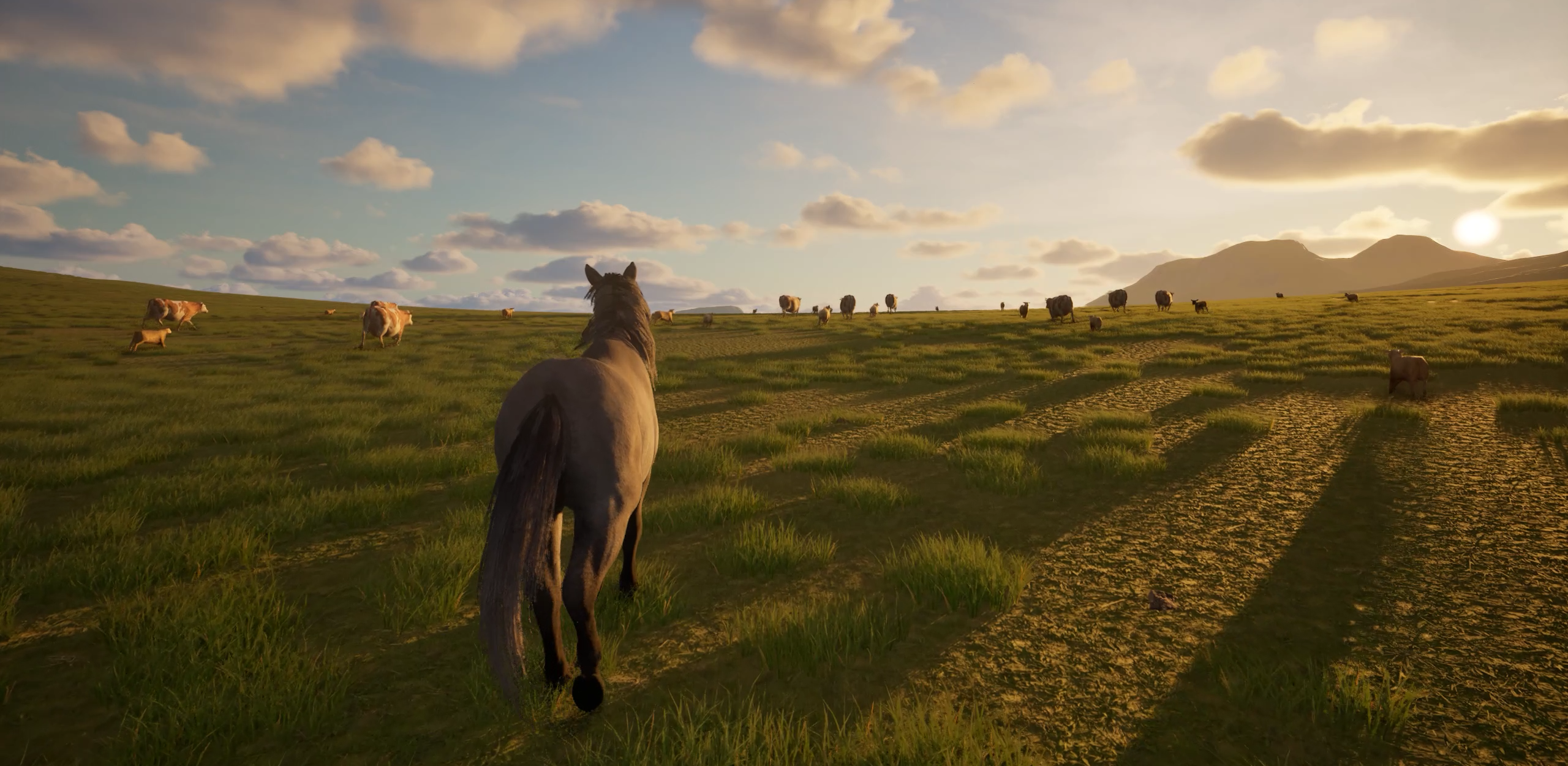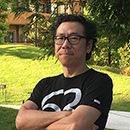Greetings
ご挨拶
-
-
桐山 孝司 Takashi Kiriyama
-
東京藝術大学大学院映像研究科長
大学院映像研究科メディア映像専攻教授 Professor, Department of New Media
Dean, Graduate School of Film and New Media
Tokyo University of the Arts
2023年度のゲームコースについて
東京藝術大学では本年度から、大学の世界展開力強化事業~米国等との大学間交流形成支援~により「STEAM教育を活用した情報メディア革新時代の日米映像クリエイター育成」を行うことになりました。これは2018年度から5年間継続した⼤学の世界展開⼒強化事業「⽇⽶ゲームクリエイション共同プログラム」の実績をもとに、新たに2023年度から5年間の計画が文部科学省に採択されたものです。事業の推進役となる大学院映像研究科ゲームコースでは、さっそく南カリフォルニア大学映画芸術学部と連携して授業科目の整備や人材交流を実施しています。今回のゲームコース展も、同学部から多数の教員、学生の参加を得て開催できることを嬉しく思います。
現在、生成AIの進化がゲーム制作にも影響を及ぼしています。実現したいことを示せば、AIがコードを補完してプログラミングを支援するようになりました。また画像生成AIを、見え方を含めたゲームの試作に役立てることができるようになりました。すでに今回のゲームコース展の作品でも、プログラミング支援や音声認識を使ったユーザインタフェースなど、さまざまな形でAIが関わっています。AIで足りない技能を補えるようになったことは、制作プロセスを加速する上ではありがたいことです。一方でAIの存在を前提として何を作っていくのかは、制作者にとって大きな課題になります。ゲームコースでもデジタルコンテンツ一般にも関わるものとして、今後のAIを前提とした創作についての考え方や実践方法を開拓していきたいと思います。
Game Course 2023
Starting this year, Tokyo University of the Arts will carry out "STEAM-Driven Japan-U.S. Joint Program for Innovative Visual Media Creators" through the program of Support for Creation of Inter-University Exchanges with U.S. Universities. This is a new five-year plan starting in 2023 that was selected by the Ministry of Education, Culture, Sports, Science and Technology based on the results of the "Japan-U.S. Educational Initiative on Creating Games as a Comprehensive Artistic Practice" that continued for 5 years starting in 2018. The Graduate School of Film and New Media's Game Course, which will be the driving force behind the project, has immediately started collaborating with the University of Southern California's School of Cinematic Arts to improve its course offerings and conduct exchanges of graduate students. We are pleased to be able to hold GEIDAI GAMES 05 with the participation of many faculty members and graduate students from USC.
Currently, the evolution of generative AI is having an impact on game production. Based on the context you provide, AI can assist you with the programming by supplementing codes. Generative AI can now be used to prototype games as well, including their visual representation. Not surprisingly, AI is involved in the works of this year's Geidai Games Exhibition in various ways, such as programming support and user interfaces using voice recognition. The ability to use AI to fill in the missing skills is a blessing in terms of accelerating the production process. On the other hand, having such a resource, deciding what to create is now a major challenge for creators. As it pertains to both the production of games and digital contents in general, we would like to develop perspectives and practical methods for creation with the present and future existence of AI.
-
-
-
岡本 美津子 Mitsuko Okamoto
-
東京藝術大学副学長
大学院映像研究科アニメーション専攻教授 Vice President
Professor, Department of Animation
Graduate School of Film and New Media
Tokyo University of the Arts
プレイテストなるもの
本学ゲームコースの学生は、年に数回「プレイテスト」と称する会に参加しなくてはならない。自分の制作中のゲームを、他の人に実際にプレイしてもらい、その様子を観察したり、プレイした体験者たちから様々なコメントをもらったりする場である。
プレイテストには、ゲームコース教員のほか、他専攻の学生やOB/OG、外部講師の先生たちなど、初めてそのゲームをプレイする人々も招かれる。
会はとてもカジュアルな雰囲気で進行する。体験者たちは、ゲーム作者がいる机の間を巡って、空いている学生のゲームから個々に体験していく。あちこちで体験者の笑いやゲームの音が響き、まるで教室がゲームセンターのようである。
芸術分野では、作品の途中段階や完成版に対して、「講評会」という形で、教員をはじめとする講評者たちがコメントやアドバイスを行うのが一般的である。専門的知見や体系的な知識を持った講評者たちが、その作品を評価し、その表現の歴史の中に位置付けるための「言説」を与えていくというものであるが、ゲーム分野におけるプレイテストはこの講評会とは全く異なる考え方を持つ。
第1に、個々がどんなコメントをもらっているかについて、我々教員や学生同士はそれを把握し得ない点。第2に、体験者は教員であろうが、他専攻の学生であろうが、一般の方であろうがフラットな立場であり、そこに上下関係は存在しない点。第3に、講評会では往々にして講評者の発言はフリーハンドであるが、プレイテストにおいて、テストしたい項目はあらかじめ作者本人が決めている点、などである。
我々が2018年来、コラボレーションを行っている、全米大学院ゲーム教育No.1の南カリフォルニア大学インタラクティブ・メディア&ゲームズ 学科も、このプレイテストを実によく実施することで知られている。
ゲームは、体験者がプレイすることで完結する表現であり、言い換えればプレイヤーが体験を通じて作者のテーマやメッセージを受容する表現とも言える。従って、その制作プロセスの中で、体験をテストする「プレイテスト」は非常に重要な意味を持つのである。我々はこのプレイテストを教育カリキュラムに落とし込み、芸術教育に新たな知見を付加できればと思っている。
The Significance of the Playtest
The students in the Game Course at our university must participate in a gathering called a playtest several times a year. It is an occasion where people play the games that are being developed by them. The students will observe how the playtesters play and react, and also receive feedback from them.
In addition to the game faculty, we invite people to the playtests who have never played the games before, such as students from other departments, alumni, and lecturers.
The meetings progress in a very casual atmosphere. Each playtester is free to move around the classroom amongst the game creators and experience whatever game is available. Laughter and game sounds echo throughout the room, making it feel like an arcade rather than a classroom.
In the field of art, it is common for feedback and advice to be given by reviewers, including faculty, in the form of a critique at significant production stages and completion. Reviewers with expertise and systematic knowledge of the field evaluate the work and provide discourse to position it within the history and entirety of the genre. However, academic playtests of games have a completely different approach from these critiques.
For one, the faculty and other students than the one receiving feedback have no way of grasping what comments were given to the individual designers. In addition, all playtesters, whether they are faculty, students from other departments, or the general public, are treated equally with no hierarchical relationship. Third, in an art critique, what the reviewers say are of their own accord. But, in a playtest, the aspects to be tested are predetermined by the designers.
Our collaborator from 2018, the Interactive Media & Games division at the University of Southern California, ranks as the No.1 program in games education in the United States. They are also well known for their frequent implementation of playtests.
Games are a form of expression that cannot be completed without having players experience them. In other words, they are expressions in which the players receive the creator’s ideas and messages through experience. Therefore, the playtest, which tests these experiences, is of great importance in games production. We hope to incorporate the playtest effectively into our curriculum and add new insights to art education.
-
GAMES
GAMES
Thesis Projects
修了作品
-

RlungRta -Wind Horse- RlungRta -Wind Horse-
ゲーム実況配信山根 風馬(修士2年)Fuma Yamane (2nd-year Master’ s)
-

Life Finds a Way Life Finds a Way
ゲーム実況配信王 昊宇(修士2年)Haoyu Wang (2nd-year Master’ s)
-

ゲロゲロ! GeroGero!
ゲーム実況配信スィウランポン チャンヤ(修士2年)Chanya Sriuranpong(2nd-year Master’ s)
M1 Projects
1年次作品
-

walking teddy walking teddy
潘 宇(修士1年)PAN Yu (1st-year Master’s)
-

キヨの部屋 Kiyo’s Room
みさはる(修士1年)MISAHARU (1st-year Master’ s)
-

らくがきフレンズ graffiti friends
オウ シギ(修士1年)WANG Siyi (1st-year Master’ s)
-

今日はわたしの誕生日 Today is My Birthday
王 憶雪(修士1年)Yixue Wang (1st-year Master’ s)
-

Where are we going? Where are we going?
古池 安由実(修士1年)Ayumi Koike (1st-year Master’ s)
-

そしてナイフを手にした(プロトタイプ) So he grabbed the knife (Prototype)
クワ ウケン(修士1年)Sam KUWA (1st-year Master’ s)
-

Whale Fall ※更新版 Whale Fall Updated version
山根 風馬(修士1年 ※制作当時)Fuma Yamane (1st-year Master’s at time of production)
Affiliated Projects
協力展示
-

Time Flies Time Flies
ミヒャエル フライMichael Frei
-

Five Years Old Memories Five Years Old Memories
小光Komitsu
-

詩が書けなかった日 The day I couldn’t write a poem
Zennyan (田井中 善意) +mikyokyuji (薄羽 涼彌)Zennyan (Zeni Tainaka) +mikyokyuji (Ryoya Usuha)
-

指・ひも・カギ Finger-String-Key
薄羽 涼彌Ryoya Usuha
-

ルビを振るゲーム Furigana Shooter
薄羽 涼彌Ryoya Usuha
-

ゲーム制作演習 有志成果展示 Undergraduate Game Projects
薄羽 涼彌(講師)Ryoya Usuha (Lecturer)
受講有志学生Students
Event Outline
開催概要
- 会期
- 2024年3月16日(土)/17日(日)
- 開催時間
- 10:00~18:00 (最終日は17:00まで)
- 会場
- 東京藝術大学 上野キャンパス美術学部 総合工房棟 多目的ラウンジ・オープンアトリエ
〒110-8714 東京都台東区上野公園12-8
Google マップでみる

- 交通案内
-
JR 上野駅(公園口)・鴬谷駅 下車徒歩10分 地下鉄 銀座線・日比谷線上野駅 下車徒歩15分
千代田線・根津駅 下車 徒歩約10分京成電鉄 京成上野駅 下車徒歩15分 都営バス 上26系統(亀戸←→上野公園)谷中バス停 下車徒歩約3分
- 入場料
- 無料(事前予約不要)
- 主催
- 東京藝術大学大学院映像研究科
- ※文部科学省「大学の世界展開力強化事業~米国等との大学間交流形成支援~」事業として実施
- 協力
- 南カリフォルニア大学映画芸術学部
株式会社スクウェア・エニックス
横浜市にぎわいスポーツ文化局
東京藝大アートDXプロジェクト
東京藝術大学 共創の場形成支援プログラム拠点
- 同時開催
- 東京藝術大学 芸術未来研究上 アートDXプロジェクト/I LOVE YOU プロジェクト 2023 成果発表展 (附属図書館ラーニングコモンズ(美術校舎側) アーツ&サイエンスラボ 1F ギャラリー及び4Fホール(音楽校舎側))
https://artdx.geidai.ac.jp/exhibition/01/
- クレジット
-
- 東京藝術大学大学院映像研究科
- 桐山孝司 岡本美津子 牧奈歩美 江口麻子
薄羽涼彌 吉野範子 久保田勇 西川順子
- 東京藝術大学企画総務課国際戦略係
- 萩原優里
- 株式会社スクウェア・エニックス
- 時田貴司
- 南カリフォルニア大学映画芸術学部 University of Southern California School of Cinematic Arts
- ダニー・ビルソン Danny Bilson アンドレアス・クラッキー Andreas Kratky ピーター・ブリンソン Peter Brinson
- 会場設営
- 松本祐一 (Yuichi Matsumoto)
- メインビジュアル
- スィウランポン チャンヤ(東京藝術大学大学院映像研究科メディア映像専攻ゲームコース)
- Date & Time
- March 16th 10am - 6pm, March 17th 10am - 5pm
- Venue
- Tokyo University of the Arts Ueno Campus Factory Complex Building
12-8 Ueno Park, Taito-ku, TOKYO 110-8714 JAPAN
Google map

- Transportation
-
JR About a 10 min. walk
From either “Ueno (Park exit)” or “Uguisudani” stations.Subway About a 15 min. walk
From “Ueno” station on the Ginza and Hibiya subway lines.
About a 5 min. walk
From “Nezu” station on the Chiyoda subway line.Keisei
Electric RailwayAbout a 15 min. walk
From “Keisei-Ueno” station on the Keisei electric railway.Toei Bus About a 3 min. walk
From “Yanaka” bus stop on the Toei Bus(26 Kameido-Ueno Park).“Megurin” About a few min. walk
From “5-1.Tokyo Geijyutsu Daigaku (Tokyo University of the Arts)”
The Touzai Megurin(East-West Route)
*Megurin: Taito city circlar route bus.
- Admission
- Free entry; no booking required
- Organized by
- Tokyo University of the Arts Graduate School of Film and New Media
- Cooperation
- University of Southern California School of Cinematic Arts
SQUARE ENIX Co., Ltd.
City of Yokohama Sports, Culture and Dynamic City Development Bureau
Tokyo Geidai ArtDX Projects
Tokyo University of the Arts COI-NEXT
- Tokyo University of the Arts Graduate School of Film and New Media
- Takashi Kiriyama Mitsuko Okamoto Yuichi Matsumoto
Asako Eguchi Nahomi Maki Ryoya Usuha
Noriko Yoshino Isamu Kubota Yoriko Nishikawa
- Partner Event
- Tokyo Geidai ArtDX EXPO #01
Library (Learning Commons), Arts & Science LAB. (1F Gallery, 4F Hall)
https://artdx.geidai.ac.jp/exhibition/01/
- Credits
-
- Tokyo University of the Arts Graduate School of Film and New Media
- Takashi Kiriyama Mitsuko Okamoto Nahomi Maki Asako Eguchi Ryoya Usuha Noriko Yoshino Isamu Kubota Yoriko Nishikawa
- Tokyo University of the Arts International Initiatives Planning Sectio
- Yuri Hagiwara
- SQUARE ENIX Co., Ltd.
- Takashi Tokita
- University of Southern California School of Cinematic Arts
- Danny Bilson Andreas Kratky Peter Brinson
- Site Supervisor
- Yuichi Matsumoto
- Key Visual
- Chanya Sriuranpong (Tokyo University of the Arts Graduate School of Film and New Media)
GEIDAI×USC
GEIDAI×USC
東京藝術大学大学院映像研究科 Tokyo Geidai Graduate School of Film and New Media 南カリフォルニア大学映画芸術学部 University of Southern California
2023年度に文部科学省による「大学の世界展開力強化事業〜米国等との大学間交流形成支援〜」に採択され、STEAM教育を活用したメディア革新時代の国際的クリエイター育成を目指しています。本事業では、全米トップのゲーム教育機関を含むUSC映画芸術学部と本校双方のメディア教育水準を高めるために、学生・教員による様々な交流プログラムを実施します。
2018年度に採択された大学の世界展開力強化事業に引き続き、今年度で東京藝大×USC共同事業は6年目となります。本年度採択の事業ではUSC映画芸術学部に加え工学部との連携も開始し、テクノロジーによるイノベーションも目指していきます。
新事業のキックオフとして、2023年12月に藝大生が渡米、USCを訪問し、双方の作品を発表・講評しました。また、USCアンドレアス・クラッキー教授およびピーター・ブリンソン教授の指導による東京藝大×USCゲームジャムを行いました。
In 2023, the Japanese Ministry of Education, Culture, Sports, Science and Technology selected our proposal of “STEAM-Driven Japan-U.S. Joint Program for Innovative Visual Media Creators” for the Inter-University Exchange Project with U.S. universities.
First selected in 2018 for the preceding national project, Tokyo Geidai Graduate School of Film and New Media and the University of Southern California School of Cinematic Arts have since been jointly exploring methods to improve games and media education for both faculty and students. The new round will welcome the addition of USC School of Engineering to augment technological innovation and to pursue a well-rounded STEAM education in the visual media arts.
To launch the new round of partnership, in 2023, the schools organized a one-day game jam that began with a meeting of the students in Los Angeles. The project will continue in Tokyo in March 2024 during the Tokyo Geidai exhibition period.
Messages from USC
USC からのメッセージ
GEIDAI × Industry
産学協同
-
産業界からの教育への参加について
2019年度までは、学生一人につき一名のメンターをスクウェア・エニックス・グループより選出していただいていましたが、2020年度からは手法を変更し、一名のメンターに全学生のプロジェクトを総括的に見ていただく形をとりました。同年度からメンターを務めていただいている同社プロデューサーの時田貴司氏を、東京藝術大学特別教授としてお招きし、より密度の高い、多角的なアドバイスをいただいています。
Industry Involvement in Academia
Up until the end of the academic year 2019, one mentor from the Square Enix Group was assigned to each student. A new practice was implemented in 2020 where one mentor, Producer Takashi Tokita from Square Enix, gives guidance to all of the students and their projects comprehensively. Also aTokyo Geidai Visiting Professor, Tokita continues to provide advice that is on the mark and eye-opening.
-
-
 時田貴司 Takashi Tokita
時田貴司 Takashi Tokita - 株式会社スクウェア・エニックス プロデューサー 東京藝術大学特別教授
1984年から演劇活動のアルバイトとしてゲーム制作に参加。
デザイナー、プランナー、ディレクターを経て現在はプロデューサーとして従事。
代表作はFINAL FANTASY Ⅳ、LIVE A LIVE、クロノ・トリガー、半熟英雄シリーズ、ナナシ ノ ゲエムなど。 Producer, SQUARE ENIX CO., LTD. Visiting Professor, Tokyo University of the Arts
Tokita began creating games in 1984 as a part-time job while pursuing theater. He has participated in games production as a designer, planner, director, and most recently, as producer. His main projects include FINAL FANTASY IV, LIVE A LIVE, Chrono Trigger, the Hanjuku Hero series, and Nanashi no Game.
藝大ゲームス試食会へのご招待状
ゲームといっても新旧多種多様なゲームが混在する現代。
自分のゲームを制作するとなると、何をどうゲームにするか、テーマの決定から、表現方法、技術の選択と無数の分岐点が存在します。
ゲームは最新のエンターテイメントという認識が定着していますが、私は『ゲーム=料理』であると定義しています。
カレーやラーメンの無尽蔵なまでの自由度と娯楽性、本能に直結するその魅力は、食べるエンタメといえば共感いただけることでしょう。
表現したいテーマを、どんな食材どんな調理法で、どう提供しどんな人にどう味わっていただくか。
このゲーム展はシェフやパティシェとなった学生たちの作品をみなさんにプレイしていただける絶好の試食会です。
是非たくさんのゲームを味わっていただき、忌憚のない味のフィードバックをよろしくお願いいたします。Invitation to Tokyo Geidai Games Tasting
Today, what we call games encompass a baffling variety.
When it comes to creating games, there are countless branching points at which you must make decisions: the kind of a game to make and how, the underlying theme, the methods of expression, the technologies to use, etc.
No one will argue that games are considered to be the latest form of entertainment, but I define game design as cooking.
Take curry and ramen for example. The inexhaustible ways we customize them and how much pleasure they give us by appealing directly to our primitive instincts can only be described as cuisine entertainment.
When you have a theme you want to express, you need to think about the ingredients to use and how to prepare them. Then, how will you serve it and to whom? How do you want it to taste for them?
This exhibition is a great opportunity to have guests taste the dishes made by you, the chefs and patissiers.
We ask the guests to savor these games and give the creators your honest feedback. -







